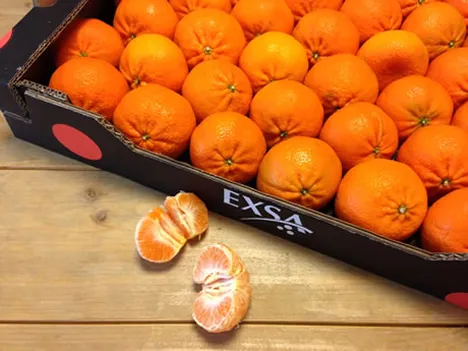This year's citrus season is yet another extraordinary one. "We were expecting fewer oranges from South Africa, but no one thought it would be this much less. In recent weeks, only 50% of last year's volumes have consistently been sent to Europe. That's too great a difference, so prices have shot up," begins Exsa Europe's Eddy Kreukniet.
"Volumes are now correcting, and South Africa is catching up. That's good, and necessary, because there's still a long season ahead before decent volumes begin coming from Spain. All three South African production areas now have good volumes available. Prices are still sky-high, as much as 30% higher than last year."
"Our industry has been quite surprised by the issues the new cold treatment - for the False Codling Moth (FCM) - regulations are causing. It took a few weeks for everyone to get used to these, with some suppliers managing to deal with them better than others," continues Eddie.
"For example, growers in the Western Cape are already well equipped to deal with the North American market's restrictions. The inspection authorities also spent the first few weeks trying to figure out how to deal with these regulations. There were plenty of questions during those first few weeks, but, by now, the market is dealing with these new rules."
Exsa Europe did not have problems with cold treatment rejections. "There were delays, however, so the fruit arrived two to three weeks later. Dealing with that takes a lot of time and energy. We had to reduce our volumes to several retailers during those weeks; there was simply no produce available. But that affected the whole market. Cost increases cause an uproar. Sea freight, alone, for oranges, costs €1.50 more than last year," explains Eddy.
"And that's not even counting all the rising energy, packaging, and other costs. It's proving difficult to pass these price hikes on to customers, so you could say the sector is restless. The current logistics problem is more manageable than last year, but that could also be because 20-30% fewer containers are being sent to Europe this season. The question is what the logistics situation will be like when the ships are full again in the winter."

"The mandarin market was excellent in August. That's usually a hard month for mandarins, but perhaps sales were good due to a lower supply of summer fruits from southern Europe. The overseas mandarin season promises to end on a high note too," says Kreukniet, who is less optimistic about grapefruit's future.
"People seem to be eating less grapefruit every year. There's, of course, the fixed sales to retailers and Eastern Europe, but the volumes are decreasing by 10-20% annually. Prices don't reflect that, though; this year, they're even lower than last season. That's undoubtedly becoming an issue for the sector."
"We'd expected plenty of lemons and a market that would chug along at that lower level. And," confirms Eddy, "with the high volumes from South Africa and Argentina, that's indeed what happened. Those large volumes are slowly decreasing. Nonetheless, we'll have to pull out all the stops to keep up in the coming weeks."
"In a month, Spain and Turkey will be entering the market. You don't want to end up with a large overlap like last year. That caused prices to drop to between €5 and €7 per box at one point. The lime market from South Africa was great in August, though. It was mostly supply-driven which led to healthy prices," Eddy concludes.
 For more information:
For more information:
Eddy Kreukniet
Exsa Europe
Tel: +31 (0) 887 350 003
Mob: +31 (0) 620 257 811
Email: info@exsaeurope.com
Website: www.exsaeurope.com
